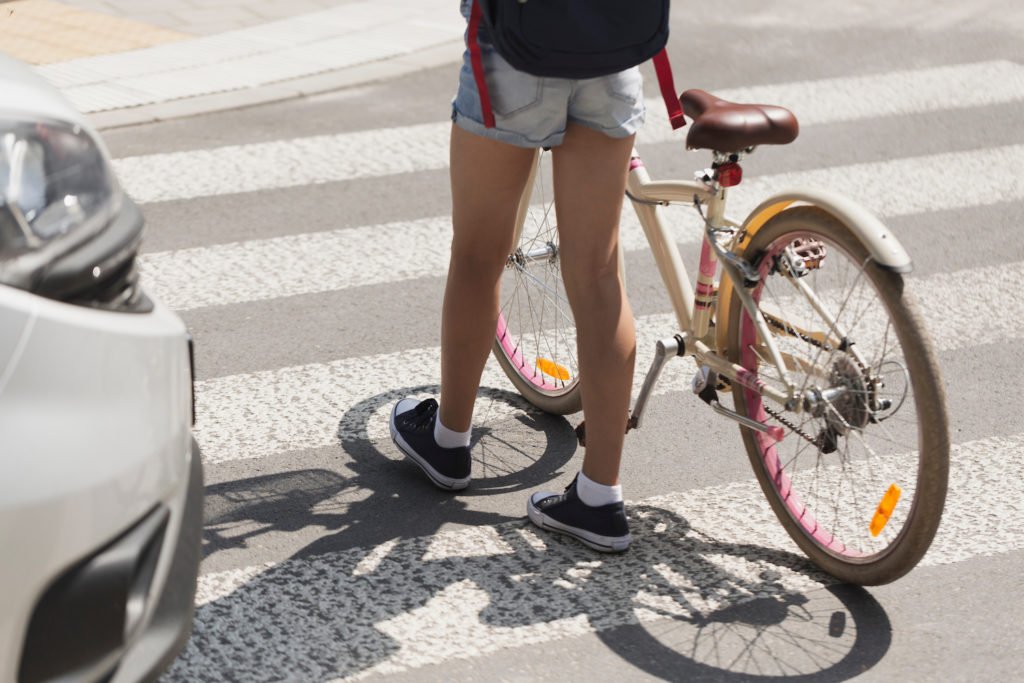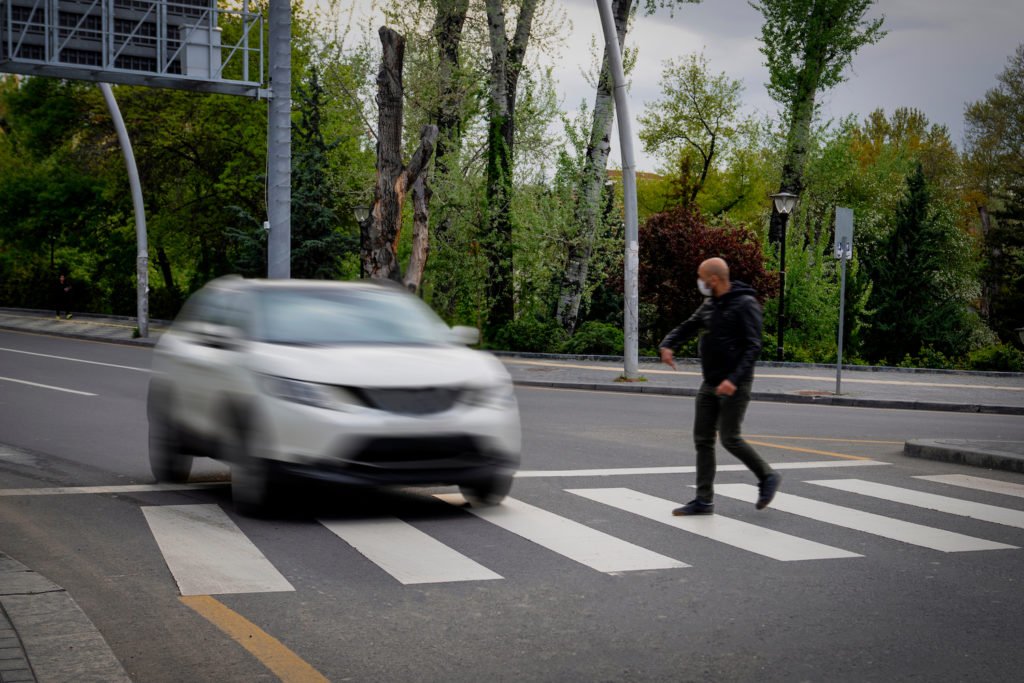
NRS 484B.283 is the Nevada traffic law that makes it a civil infraction for drivers not to yield to pedestrians at crosswalks. Penalties include up to $500 in civil penalties. But if the incident results in a minor collision, the driver would instead face charges for reckless driving (NRS 484B.653) and mandatory community service requirements.
NRS 484B.283 states:
When official traffic-control devices are not in place or not in operation, the driver of a vehicle shall yield the right-of-way, slowing down or stopping if need be so to yield, to a pedestrian crossing the highway within a crosswalk when the pedestrian is upon the half of the highway upon which the vehicle is traveling or onto which the vehicle is turning, or when the pedestrian is approaching so closely from the opposite half of the highway as to be in danger.
In this article our Las Vegas traffic ticket attorneys answer frequently-asked-questions about Nevada laws for yielding to pedestrians at crosswalks:
- 1. What is “failing to yield to a pedestrian at a crosswalk” in Nevada?
- 2. How do I fight charges?
- 3. What are the penalties under NRS 484B.283?
- 4. Can the charges get reduced?
- 5. How many points will go on my driver’s license?
- 6. Will my auto insurance premiums go up?
- 7. Do I have to do traffic school?
- 8. What will happen if I ignore my charge?
- 9. What will happen to my commercial driver’s license?
- 10. What will happen to my out-of-state driver’s license?
- 11. When can I seal my case?
- 12. Will I get deported?
- 13. Should I fight my charge or just plead guilty?
- 14. Can I go to trial?
- 15. Do I need an attorney?
If you have been injured by a driver who did not yield, contact our Las Vegas personal injury attorneys to learn how you may file suit and win a large financial settlement.
1. What is “failing to yield to a pedestrian at a crosswalk” in Nevada?
Nevada drivers must yield to pedestrians at crosswalks. Specifically, state law mandates the following:
- When official traffic-control devices are not in place or not in operation, the driver of a vehicle shall yield the right-of-way, slowing down or stopping if need be so to yield, to a pedestrian crossing the highway within a crosswalk when the pedestrian is upon the half of the highway upon which the vehicle is traveling, or when the pedestrian is approaching so closely from the opposite half of the highway as to be in danger; and
- Whenever a vehicle is stopped at a marked crosswalk or at an unmarked crosswalk at an intersection, the driver of any other vehicle approaching from the rear shall not overtake and pass the stopped vehicle until the driver has determined that the vehicle being overtaken was not stopped for the purpose of permitting a pedestrian to cross the highway.1
Drivers who hit a pedestrian in Nevada because of failing to yield at a crosswalk face charges for reckless driving. Nevada is actually one of the most hazardous states for pedestrians.2
See our related article, Do pedestrians always have the right of way in Nevada?

NRS 484B.283 requires motorists to yield to pedestrians at crosswalks.
2. How do I fight the charges?
The state has the burden to prove guilt beyond a reasonable doubt, which is a very high bar. The driver’s defense attorney may be able to show the prosecutor that insufficient evidence exists to sustain a conviction. Typical evidence in these types of cases include:
- surveillance video from traffic cameras or eyewitnesses,
- photographs from traffic cameras or eyewitnesses, and/or
- eyewitness testimony from other drivers, pedestrians, or members of Las Vegas Metro or the Nevada Highway Patrol
In some cases, the pedestrian was clearly in the wrong. Perhaps the pedestrian suddenly left the curb in the vehicle’s path. Or perhaps the pedestrian disobeyed the Walk/Don’t Walk signals. If the defense attorney can show that the pedestrian caused the accident and not the driver, criminal charges against the driver should be dropped.
3. What are the penalties under NRS 484B.283?
It depends whether there is a collision or not:
3.1. No collision
Not yielding to a pedestrian at a crosswalk is a civil infraction as long as there was no accident. The sentence is up to $500 in civil penalties. In Las Vegas, the civil penalty is usually $415.
And if the accident happened in a pedestrian safety zone, the court may double the penalties.3
3.2. With collision (reckless driving)
The penalties depend on whether the collision resulted in substantial bodily harm to the pedestrian. If there was no major harm, failing to yield at a crosswalk is misdemeanor reckless driving:
- A first-time offense carries $250 to $1,000 in fines and 50 to 99 hours of community service.
- A second-time offense carries $1,000 to $1,500 in fines and 100 to 199 hours of community service.
- A third-time or subsequent offense carries $1,500 to $2,000 in fines and 200 hours of community service.
In addition, the court may impose a maximum of six (6) months in jail. And if the accident happened in a pedestrian safety zone, the court may double the penalties; this additional penalty may not exceed $1,000 in fines, six (6) months of jail or 120 hours of community service.
Meanwhile, causing substantial bodily harm or death to a pedestrian by not yielding at a crosswalk is category B felony reckless driving. The sentence is one to six (1 – 6) years in Nevada State Prison and fines of $2,000 to $5,000. The maximum prison term becomes 10 years if the incident involved speeding at least 50 mph over the speed limit or took place in a pedestrian safety zone, school zone or a school crossing zone.4

Failing to yield to a pedestrian at a crosswalk is a civil infraction.
4. Can the charges get reduced?
It is possible; however, prosecutors are more resistant to reducing traffic charges in cases where someone gets harmed.
5. How many points go on my driver’s license?
People charged with failing to yield at crosswalks without causing an accident will have four (4) demerit points added to their Nevada license. Meanwhile, people charged with reckless driving will have eight (8) demerit points put on their license.
Getting twelve (12) or more demerit points within a year will cause a six (6) month license suspension. Drivers can request a hearing with the Nevada DMV to contest license suspensions, but they are advised to retain counsel to represent them.5
Note that driving on a suspended license is a misdemeanor in itself that carries up to six (6) months in jail and/or up to $1,000 in fines.6
6. Will my auto insurance rates go up?
Usually, yes. But if the defense attorney succeeds in getting the charges dismissed or reduced to a non-moving violation, insurance rates should stay the same.
7. Do I have to do traffic school?
Not necessarily, though doing traffic school may be a way to persuade the judge to reduce or dismiss the charges.7
8. What will happen if I ignore my case?
If you are charged with a civil infraction, you can be assessed with a late penalty for failing to pay on time.
If you are charged with a misdemeanor, you get a 30-day grace period before the court will issue a bench warrant. And if you fail to pay the fine, the judge may not issue a bench warrant until this happens: You are given the opportunity to do community service in lieu of the payment, and you then fail to do the community service.
Bench warrants stay active until your attorney files a “motion to quash the warrant” and convinces the judge to recall the warrant. And while the warrant is active, you can be arrested at any time and held without bail.8

Failing to yield to a pedestrian at a crosswalk carries 4 DMV demerit points.
9. What will happen to my commercial driver’s license?
Both the driver’s regular driver’s license and commercial driver’s license (CDL) in Nevada will receive four (4) demerit points if there was no accident, or eight (8) demerit points if there was. This is true no matter what car the driver was operating at the time. CDL-holders must tell their boss about the traffic charge within thirty (30) days of the accident.9
9.1. CDL Suspension
Note that reckless driving is considered a “serious offense” under federal law. This means that CDL-holders who pick up two (2) “serious offenses” within a three (3) year time span will get a 60-day CDL suspension. And for a third offense, the driver’s CDL will be suspended for 120 days.10
10. What will happen to my out-of-state license?
It varies state-to-state, so an attorney from the driver’s home state should be consulted.
11. When can I seal my case?
Misdemeanor convictions may be sealable one (1) year after the case ends. Felony convictions may be sealable five (5) years after the case ends.11 And traffic charges that get dismissed may be sealable right away. Learn how to get a record seal in Nevada.12
12. Will I get deported?
Failing to yield at a crosswalk is not a deportable crime, so immigration status should not be affected … but there is no guarantee. Aliens should consult experienced counsel whenever they are facing criminal charges to discuss deportation issues.
13. Should I fight my charge or just plead guilty?
Yes. Chances are decent that a good criminal defense attorney can negotiate a significant charge reduction or dismissal that can save the driver’s license, pocketbook, and insurance rates.
14. Can I go to trial?
If you wish to contest the citation, you can request a hearing in front of the judge.13
15. Do I need an attorney?
Having an attorney is always recommended and tends to get better results than unrepresented defendants. And if a defendant hires an attorney, chances are the defendant will never have to go to court and can rely on the attorney to make all court appearances.

Call our law firm for legal advice. We offer consultations.
Were you arrested for not yielding to a pedestrian at a crosswalk in Clark County or elsewhere in Nevada? For a consultation, contact our Las Vegas criminal defense attorneys right now. Our goal is to try to get your charges dismissed or reduced to a non-moving violation with lower or no fines, fewer or no demerit points, and no traffic school. For tickets in California, please see our article on Vehicle Code 21950 CVC – California law on failing to yield to pedestrians.
Were you or a loved one injured at a crosswalk by a driver who did not yield? Our Las Vegas car accident attorneys will fight for compensatory damages to pay for all your medical bills, pain and suffering, lost wages, and loss of future earnings, and more. You may still be able to recover money if you were partially to blame. And we do not get paid unless you get paid.
In California? Read about Vehicle Code 21800 CVC.
In Colorado? Read about CRS 42-4-703.
Legal References:
- NRS 484B.283; Nevada DMV Violation Codes; the Nevada DMV refers to “failing to yield to a pedestrian as a crosswalk” as FTY Row To Pedestrian Or Exercise Due Care To Avoid A Collision With A Pedestrian, Violation Code 425 or ACD Code N08.
- Id.; Mick Akers, “Nevada among the most dangerous states for pedestrians“, Las Vegas Review-Journal (November 4, 2019).
- NRS 484B.283; NRS 484B.135. AB 116 (2021).
- NRS 484B.283.
- NAC 483.500; NAC 483.510; Nevada DMV Violation Codes.
- NAC 483.764.
- See, for example, Las Vegas Justice Court Traffic School.
- NRS 173.155; see, for example, motion to place on calendar to quash the warrant at Las Vegas Justice Court; Nevada DMV Suspension.
- NAC 483.500; NAC 483.510.
- 49 CFR §383.51.
- NRS 179.245.
- NRS 179.255.
- Sixth Amendment.

